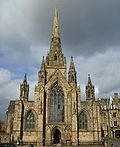| St Augustine's Church | |
|---|---|
 St Augustine's Church | |
 | |
| 53°30′39″N2°19′21″W / 53.5107°N 2.3224°W | |
| Location | Pendlebury, Greater Manchester |
| Country | England |
| Denomination | Anglican |
| Churchmanship | Anglo-Catholic |
| History | |
| Dedication | St Augustine |
| Consecrated | May 1874 |
| Architecture | |
| Functional status | Active |
| Heritage designation | Grade I |
| Architect(s) | George Frederick Bodley |
| Architectural type | Church |
| Style | Gothic Revival |
| Groundbreaking | 1871 |
| Completed | 1874 |
| Specifications | |
| Materials | Red brick |
| Administration | |
| Province | York |
| Diocese | Manchester |
| Archdeaconry | Salford |
| Deanery | Eccles |
| Parish | Swinton and Pendlebury |
St. Augustine's Church is an active Anglican church in Pendlebury, Greater Manchester, England. Dedicated to St Augustine, it is part of the benefice of Swinton and Pendlebury along with St Peter's Church in Swinton and All Saints' Church in Wardley. The church is in the Eccles deanery, the archdeaconry of Salford and the diocese of Manchester. [1] The church was granted Grade II* listed status in 1966 but has since been upgraded to Grade I. [2]
Contents
- History
- Architecture
- Exterior
- Interior
- Clergy
- Churchyard
- Reception
- Current condition
- See also
- External links
- References
Called the "Miners' Cathedral", due to its almost cathedralesque stature, in the heart of a one time coal-mining community, it was also sometimes locally called "Gussie's".
The church is situated on Bolton Road and has a connected primary school.






